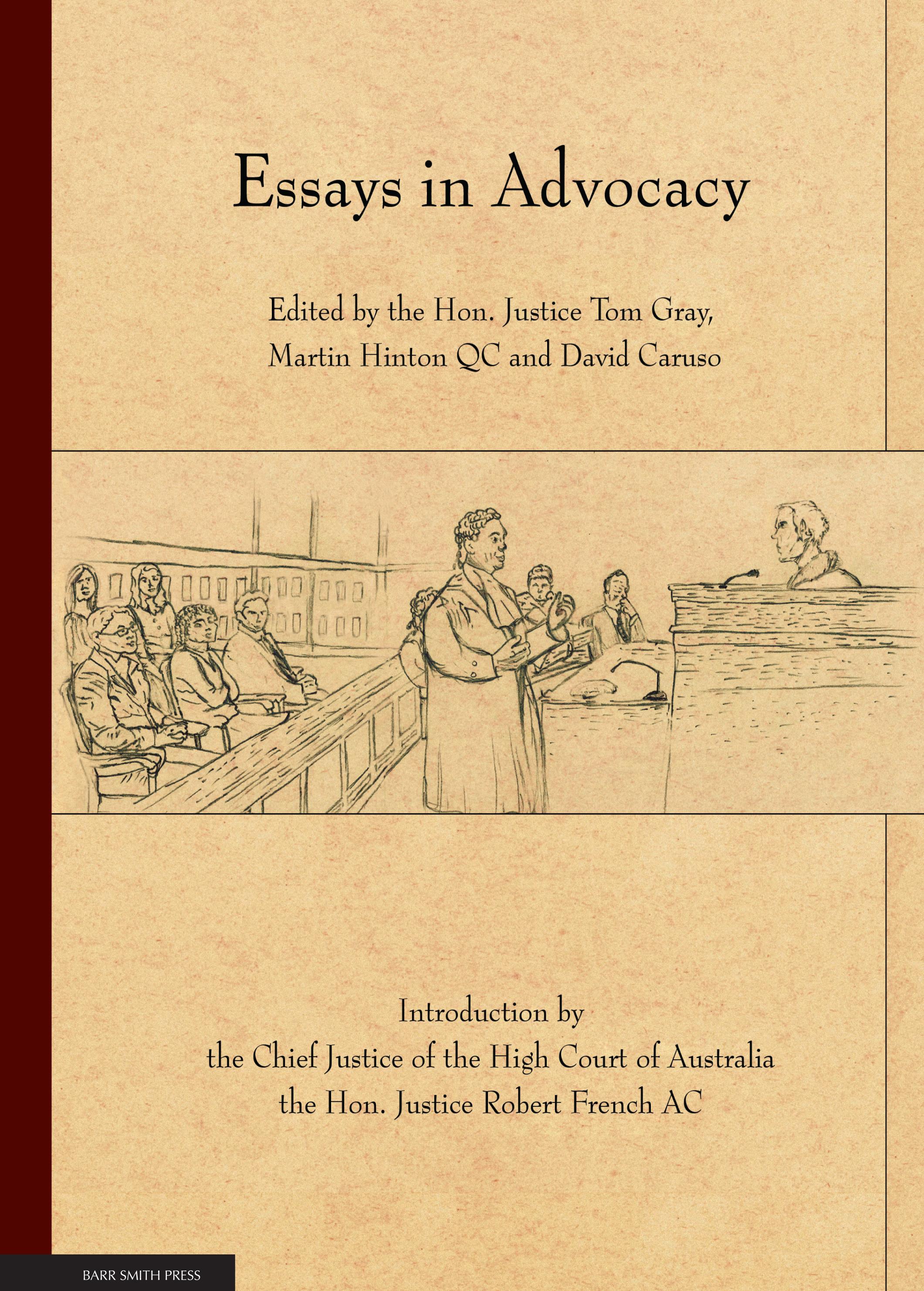Essays in Advocacy

edited by Tom Gray, Martin Hinton and David Caruso
$99.00 | 2012 | Paperback | 978-0-9871718-3-2 | 610 pp
DOI: https://doi.org/10.20851/advocacy
This title is sold independently of the University of Adelaide Press. Clicking on the button below will take you to the book seller’s website.
-
Chapter details
Foreword The Hon. Justice Tom Gray
Introduction The Hon. Justice Robert French AC, Chief Justice of the High Court of Australia
Etiquette Elisa Holmes
Part one: Ethics, Duties and Obligations
The Importance of the Advocate to the Administration of Justice The Hon. Justice Jennifer Davies
Ethical Obligations of the Advocate Jonathan Wells QC
The Obligations and Duties of Silk and their Juniors Michael Grant QC
The Attorney-General as Advocate The Hon. John Rau MP and Chad Jacobi
The Prosecutorial Discretion The Hon. Justice Richard Refshauge
The Solicitor/Barrister Relationship John Goldberg
Part two: Preparation
Taking Instructions and Advising the Client Anthony Kerin
Pleadings: A conceptual Guide to Practical Legal Drafting Ian Robertson SC
Written Advocacy: Writing with Effect and Persuasion The Hon. Justice G T Pagone
The Advocate and Language Julian Burnside QC
Criminal Trial Preparation Paul Muscat QC
Civil Trial Preparation Mark Livesey QC
Part three: The Trial
The Duties of the Prosecutor The Hon. Roderick Howie QC
The Voir Dire The Hon. Justice John Sulan
Opening a Trial Walter Sofronoff QC
Examination-in-Chief Adam Kimber SC
The Child and the Trial The Hon. Robyn Layton QC
Representing Minorities His Hon. Judge Sydney Tilmouth
Experts The Hon. Justice Bruce Lander
Closing Addresses The Hon. Justice Michael David
The Magistrates Court Trial The Chief Magistrate Elizabeth Bolton
The Trial by Judge Alone Grant Donaldson SC
The Serious and Complex Commercial Trial The Hon. David Bleby QC
Part four: Alternatives to Trial
Alternative Dispute Resolution The Hon. Bruce Debelle QC
Mediation Stephen Walsh QC
Restorative Justice The Hon. E P Mullighan QC and Leigh Garrett
Part five: Tribunals, Inquiries and Miscellaneous Hearings
Injunctions The Hon. Justice John Mansfield AM
Disciplinary Tribunals The Hon. Justice Kevin Duggan AM
The Environment, Resources and Development Court Brian Hayes QC
Industrial Commissions and Tribunals His Hon. Judge Peter McCusker
Coronial Inquiries His Hon. Judge Wayne Chivell
An Advocate's Role in Inquiries Dick Whitington QC
Part six: Sentencing and Remedies
The Plea in Mitigation David Edwardson QC
Remedies The Hon. Justice Malcolm Blue
Part seven: Appeals
Permission to Appeal The Hon. Justice Anthony Besanko
Appeals Before Single Judges The Hon. Justice Richard White
Appeals Against Sentence His Hon. Judge Paul Cuthbertson
Appeals Before the Full Court and the Court of Criminal Appeal The Hon. Justice John Doyle AC, Chief Justice of South Australia
Part eight: Applications for Judicial Review
Applications to Judicial Officers Paul Slattery QC
Applications for Judicial Review Chris Bleby and Phillip McNamara QC
Part nine: Proceedings in the High Court and Petitions
Special Leave to Appeal or Special Appeal to Leave - Does Advocacy Matter? The Hon. Justice Chris Kourakis
Matters in the High Court Arising Under the Constitution or Involving its Interpretation Stephen Gageler SC
The Institution of Mercy Martin Hinton QC and David Caruso
Afterword
The Seven Virtues of Advocacy The Hon. Justice Margaret White
The Lighter Side Kevin Borick QC
Any observer of advocacy in Court will be struck by the dissimilarity of advocates’ styles, mannerisms, eloquence and the manner or mode of persuasion. The power of persuasion is innate, idiosyncratic and unpredictable. There is a danger in attempting to teach a particular style of manner of delivery. This publication approaches advocacy in an entirely different way. The reader of the publication is at times entertained, and other times subjected to concentrated study. Some authors write in an elegant manner, others in a scholarly fashion. Pragmatic advice is the approach of yet others. Each author through their essay displays their own unique style of persuasion. The editors have eschewed any thought of attempting any degree of homogeneity. The authors have wanted the student, the reader and the critic to identify and respect these differences. They are the very essence of advocacy.
The essays should appeal to a wide-ranging audience. One of the purposes of this publication is to provide a text for the undergraduate, for the student undertaking professional legal training and for the young practitioner in early years of their work as advocates. The editors have the expectation that the work will have wider uses. It is expected that school students in their final years, engaging in legal studies, in mock trial and in mooting competitions will find the essays both inspirational and motivational.
from the ‘Foreword’ by Justice Tom Gray
